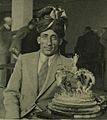Mir Sultan Khan facts for kids
Quick facts for kids Mir Sultan Khan |
|
|---|---|
| Full name | Sultan Khan |
| Country | British India, now Pakistan |
| Born | 1905 Punjab, British India |
| Died | April 25, 1966 (aged about 61) Punjab, Pakistan |
Malik Mir Sultan Khan (born 1905 – died April 25, 1966) was one of the strongest chess players from Asia during his time. He was an assistant to Colonel Nawab Sir Umar Hayat Khan from British India. Sultan Khan traveled with Sir Umar to Britain, where he quickly surprised the chess world with his amazing skills.
He played chess internationally for less than five years, from 1929 to 1933. During this short time, he won the British Chess Championship three times. He won in 1929, 1932, and 1933. His results in tournaments and matches showed he was among the top ten players in the world. After this, Sir Umar brought him back to his homeland. Sultan Khan then stopped playing chess and returned to his quiet life. Many people called him "perhaps the greatest natural player of modern times." He was widely seen as a grandmaster, but when FIDE (the world chess organization) took over chess, he was not officially recognized. At a FIDE meeting in 1948, some older players were given titles for their past achievements, but Sultan Khan was not one of them.
Contents
How Sultan Khan Learned Chess
Sultan Khan learned an Indian form of chess from his father when he was nine years old. This version of chess was similar to the modern game. However, it still had some rules from older Arabic chess. For example, pawns could only move one square on their first move. This meant that the start of the game was less about memorized moves. It also meant that games developed more slowly.
By the time Sultan Khan was 21, he was the best player in the Punjab region. At that point, Sir Umar invited him to live with him. Sir Umar wanted to teach Sultan Khan how chess was played in Europe. He also wanted to help him play against top European players. In 1928, Sultan Khan won the all-India championship. He won eight games, had one draw, and did not lose any games.
His Amazing Chess Career
After some training with British chess masters, Khan entered the British Chess Championship. To everyone's surprise, he won the championship. In May 1930, Sultan Khan began his international chess career. He played against and defeated many of the world's leading players.
Top Tournament Results
Sultan Khan had many great results in tournaments:
- He finished second to Savielly Tartakower at Liège in 1930.
- He came in third at the Hastings International Chess Congress in 1930–31. He finished behind future World Champion Max Euwe and former World Champion José Raúl Capablanca.
- He placed fourth at Hastings in 1931–32.
- He was fourth at Bern in 1932.
- He tied for third place at London in 1932. He finished behind World Champion Alexander Alekhine and Salo Flohr.
Sultan Khan won the British Championship again in both 1932 and 1933. In special matches, he defeated Tartakower in 1931. He won four games, drew five, and lost three. He also played a close match against Flohr in 1932, losing by a small margin. He won one game, drew three, and lost two.
Playing for England
Sultan Khan played three times for England at the Chess Olympiads. These are big team chess tournaments.
- At the 3rd Chess Olympiad in Hamburg in 1930, he played well. He won nine games, drew four, and lost four.
- At the 4th Chess Olympiad in Prague in 1931, he faced even stronger players. He had an outstanding result, winning eight games, drawing seven, and losing only two. This included wins against Flohr and Akiba Rubinstein. He also drew games with famous players like Alekhine, Kashdan, Ernst Grünfeld, Gideon Ståhlberg, and Efim Bogolyubov.
- At the 5th Chess Olympiad in Folkestone in 1933, he had his lowest score. He won four games, drew six, and lost four. Again, he played against some of the world's best players. These included Alekhine, Flohr, Kashdan, Tartakower, Grünfeld, Ståhlberg, and Lajos Steiner.
Return to India
In December 1933, Sir Umar took Sultan Khan back to India. In 1935, he won a match against V.K. Khadilkar, only drawing one game out of ten. After this, the chess world never heard from him again. He lived a quiet life in India until his death in 1966.
Images for kids
See also
 In Spanish: Mir Sultan Khan para niños
In Spanish: Mir Sultan Khan para niños
 | Emma Amos |
 | Edward Mitchell Bannister |
 | Larry D. Alexander |
 | Ernie Barnes |


